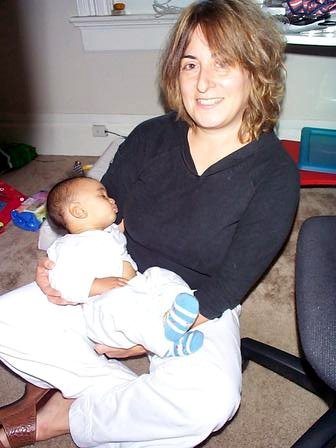Food (Bhuana Sari, 1991)
The rest of Bali is tangled green but where we are, on top of a high ridge, is flat and brown, and we can see from a distance the rice fields stepping down to the Java Sea.
To get here, we walked through the jungle, by a river, up and down mud paths that seem to twist and turn into a labyrinth's center. The path led us by the gently roaring water, past coffee bushes, under shady leaf canopies. We were focused on not falling. It was surprising and bright when the foliage and mud suddenly gave way to dust, and we blinked our way up a steep little embankment as the unloved dogs yipped shrilly at our ankles.
The fence of bamboo poles is lush and growing with vines, and we step through the gate, bowing slightly, scattering chickens. Bapak pulls up a rattan chair on the hard-packed ground in front of the kubu, and sets out a little table next to my chair as graciously as if the dirt were a parquet floor.
Pasek and his father begin talking in quick Balinese, and looking over at his prize cock in its cage in a corner of the yard, and his little sister Putu takes my hand.
I remember Pasek telling me when he was still a boy, they lived in the nice part of the village. But they had to sell the pink tiles from the roof of their house, since his father was a gambler. In junior high, he wanted to continue school, but instead he had to sell peanuts in newspaper cones at wayang kulit shows.
The cock is out of the cage and both men examine his fleshy wattle. His father motions a clean cut as if he is slicing it off. The extra flesh could slow down a fighter.
Putu leads me around the back of the kubu, where we stand on a porch of poured concrete. Chicks and piglets cross the porch on their way to snuffling out hidden corn kernels.
Mau makan, are you hungry? Putu asks me.
I am not, in this heat, but I want to be polite.
Ya, I say.
Putu flings a lock of shiny black hair behind her ear, bends slightly, and in a quick, graceful swoop, nabs a small hen. And twists its neck as if wringing out a dishcloth, then sets the hen down as it runs wildly in jerky circles until its body finally surrenders onto the concrete.
It dies, and we eat.
To get here, we walked through the jungle, by a river, up and down mud paths that seem to twist and turn into a labyrinth's center. The path led us by the gently roaring water, past coffee bushes, under shady leaf canopies. We were focused on not falling. It was surprising and bright when the foliage and mud suddenly gave way to dust, and we blinked our way up a steep little embankment as the unloved dogs yipped shrilly at our ankles.
The fence of bamboo poles is lush and growing with vines, and we step through the gate, bowing slightly, scattering chickens. Bapak pulls up a rattan chair on the hard-packed ground in front of the kubu, and sets out a little table next to my chair as graciously as if the dirt were a parquet floor.
Pasek and his father begin talking in quick Balinese, and looking over at his prize cock in its cage in a corner of the yard, and his little sister Putu takes my hand.
I remember Pasek telling me when he was still a boy, they lived in the nice part of the village. But they had to sell the pink tiles from the roof of their house, since his father was a gambler. In junior high, he wanted to continue school, but instead he had to sell peanuts in newspaper cones at wayang kulit shows.
The cock is out of the cage and both men examine his fleshy wattle. His father motions a clean cut as if he is slicing it off. The extra flesh could slow down a fighter.
Putu leads me around the back of the kubu, where we stand on a porch of poured concrete. Chicks and piglets cross the porch on their way to snuffling out hidden corn kernels.
Mau makan, are you hungry? Putu asks me.
I am not, in this heat, but I want to be polite.
Ya, I say.
Putu flings a lock of shiny black hair behind her ear, bends slightly, and in a quick, graceful swoop, nabs a small hen. And twists its neck as if wringing out a dishcloth, then sets the hen down as it runs wildly in jerky circles until its body finally surrenders onto the concrete.
It dies, and we eat.

